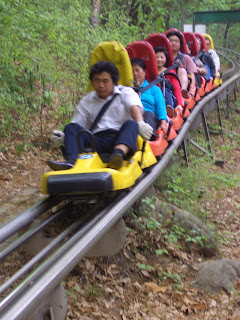


Yesterday our project team had a workshop in Tianjin (approximately two hours by car from Beijing), so I decided to stay there overnight and visit the city of Tianjin on Saturday.
Wherever I went in Tianjin there was something common: road works and construction works were going on. Maybe this is also due to the Olympics (some events will take place in Tianjin). Old hutongs are being demolished and neat houses built instead, old colonial houses are being renovated, roads are being built.
Interesting parts of Tianjin history:
1. In 1856 Chinese soldiers went on board of the "The Arrow", a Chinese-owned ship flying under the British flag because the ship was suspected of piracy, smuggling and of being engaged in opium trade. The Chinese imprisoned 12 men. In response the British and French sent gunboats to capture a fortification near Tianjin. At the end of the first part of the so-called Second Opium War, the Chinese had to sign the Treaty of Tianjin, which opened Tianjin to foreign trade. Many foreigners settled in (British, French, Italians, Germans, Russians etc) and each of these nationalities established a concession with own school, prison and hospitals.
2. In 1870 the Chinese locals attacked an orphanage managed by the French and kidnapped the nuns working there because they had heard that the children were being eaten. They had misunderstood the bible's concept of the sacraments and the body and blood of Jesus.
Still today many old colonial houses in English, French, Russian and other styles can be seen in the streets of Tianjin. Some of them have been renovated, others are abandoned and have a degenerate charm about them.
Another sights I visited were the 'Ancient Culture Street' and the 'Old Town' around Tianjins Bell Tower. This was really disappointing! The 'AAAA' rated 'first class Chinese tourist place' didn't convince me at all. Why? Well, neither the ancient culture street nor the old town were old. All the houses had been recently built, just in a somewhat old style, and all of them house tourist shops. If you are the last day in China and need a souvenir, this is maybe just the place to go to. A look behind the facades sometimes showed the real Chinese backstreets of Tianjin, but most of these have already been demolished.














